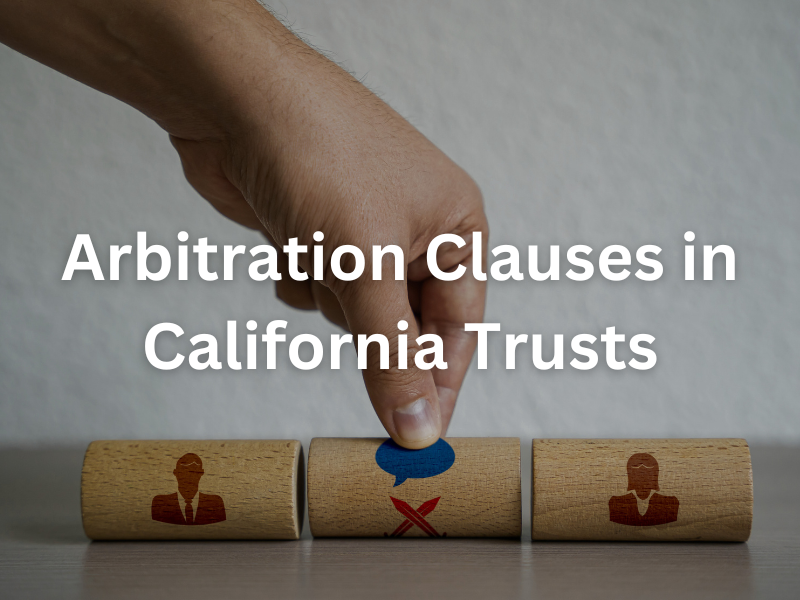
Arbitration is an alternative dispute resolution process that is less expensive than going to court. It is also private. Trust disputes aired in court are generally a matter of public record. In arbitration, the parties to a dispute present their case to an impartial third party — an arbitrator —who makes a binding decision.
Many trusts are established with clauses that require arbitration if disputes arise between trustees and beneficiaries or between multiple trustees. However, simple arbitration clauses in California trusts are not enforceable. Arbitration is always voluntary. The parties to estate disputes must agree to arbitration and to accept the arbitrator’s decision.
If you are a beneficiary or trustee of a trust in California and are being pressured into arbitration over a dispute, you may have legal options. If you are the grantor of a trust and want to ensure that inheritance disputes are handled privately in arbitration, you have options, too. At Albertson & Davidson LLP, our trust litigation lawyers can apply our in-depth knowledge of trust and estate matters in California to help you.
Contact us online or at (800) 601-0170 today for a legal consultation with an experienced trust litigation attorney.
Enforceability of Arbitration Clauses
 In most cases, an arbitration clause is part of a written contract. When each party to a contract signs it, they agree to abide by its contents. The Federal Arbitration Act mandates that arbitration agreements “shall be valid, irrevocable, and enforceable.” However, the Federal Arbitration Act applies to commerce, or the exchanging, buying, or selling of things having economic value between two or more entities, such as goods, services, and money.
In most cases, an arbitration clause is part of a written contract. When each party to a contract signs it, they agree to abide by its contents. The Federal Arbitration Act mandates that arbitration agreements “shall be valid, irrevocable, and enforceable.” However, the Federal Arbitration Act applies to commerce, or the exchanging, buying, or selling of things having economic value between two or more entities, such as goods, services, and money.
California law provides that only parties to an arbitration contract may enforce it or be required to arbitrate. In a 2011 case, California’s Second District Court of Appeal held that the beneficiary of a trust who did not agree to arbitrate disputes arising under the trust may not be compelled to do so.
In Diaz v. Bukey, 125 Cal. Rptr. 3d 610, 611 (Cal. Ct. App. 2011), the Court states:
The beneficiary of a trust petitions to remove her sister as trustee of their parents’ trust. The trustee responds by seeking to compel arbitration of their dispute as provided by the trust documents. Though the sisters are beneficiaries of the trust, neither was party to any agreement that such disputes would be resolved by arbitration. Here we hold that the beneficiary of a trust who did not agree to arbitrate disputes arising under the trust may not be compelled to do so.
Arbitration vs. Court Litigation in California Trust Disputes
If a beneficiary or trustee refuses to submit to arbitration to settle a trust dispute, the party interested in resolving the dispute would then need to hire a trust litigation lawyer to file a lawsuit and litigate the dispute in court. This is not necessarily better for either party.
Litigation is more expensive and more time-consuming than arbitration. Estate litigation attorneys handle trust litigation cases according to formal legal procedures, including a comprehensive discovery process. This can be beneficial in complex cases that will yield multiple pieces of evidence that can be used to develop your case.
Arbitration is less formal and more flexible in how sessions are conducted. The whole process is also confidential. Court proceedings are public.
One drawback of arbitration is its finality. A court case can be appealed, but parties in arbitration are usually bound to the outcome, regardless of their satisfaction.
One plus for litigation is that after a trust contest has been filed, and particularly after the discovery process is completed, informal negotiations between the parties’ attorneys may lead to a settlement without going to court.
A trust litigation attorney with Albertson & Davidson can help you determine whether arbitration or litigation is the best approach for resolving a dispute involving a trust. Our attorneys can help you prepare your case for arbitration or file a trust contest and represent you in litigation. Our estate litigation law firm can assist with every phase of the legal process, including deposing witnesses, gathering evidence, cross-examining the other party’s witnesses, and representing you at arbitration sessions or in court.
Reviewing and Amending Trust Agreements
The grantor, or settlor, of a living revocable trust, may amend the bylaws of the trust at any time. The grantor may make a full restatement of the terms of the trust. It is important to make changes with the help of an estate planning attorney to ensure that an amendment is properly drafted and executed.
A trust could make an arbitration clause enforceable against non-signatory beneficiaries by making their agreement to accept arbitration of disputes a condition of receiving any distribution from the trust. A trust document may contain an arbitration clause similar to the following:
If any beneficiary under this trust refuses to arbitrate any and all disputes pertaining to the trust, then that beneficiary’s (or beneficiaries’) distribution from the trust shall not be made, and that beneficiary shall lose all interest in the trust estate and shall not share in any portion of the trust estate.
Contact a California Trust Accounting and Contest Lawyer
 Many families use revocable living trusts to convey wealth to family members and charitable organizations and avoid probate court. Whether you are a beneficiary trying to protect your inheritance or a trustee trying to carry out your fiduciary duties, seeking a trust accounting is the starting point to determine whether a trust is being managed correctly. If there is fraud, a trust contest may be necessary to replace a delinquent trustee.
Many families use revocable living trusts to convey wealth to family members and charitable organizations and avoid probate court. Whether you are a beneficiary trying to protect your inheritance or a trustee trying to carry out your fiduciary duties, seeking a trust accounting is the starting point to determine whether a trust is being managed correctly. If there is fraud, a trust contest may be necessary to replace a delinquent trustee.
At Albertson & Davidson LLP, our clients benefit from our trial lawyers’ experience handling inheritance disputes and trust litigation in courtrooms throughout California. The goal of our probate litigation lawyers and estate litigation attorneys is to protect our client’s rights and safeguard their rightful inheritances. Our legal team comprises estate litigation attorneys who have extensive experience successfully litigating complex issues involving trust administration and the transfer of assets through trusts and wills. The law firm has offices in Los Angeles, San Francisco, Orange County, and Silicon Valley and provides legal representation to clients throughout California.
Contact us online or at (800) 601-0170 today for a free initial legal consultation. Our firm has recovered more than $250 million in verdicts and settlements for clients like you. We stand. We fight. We win.

